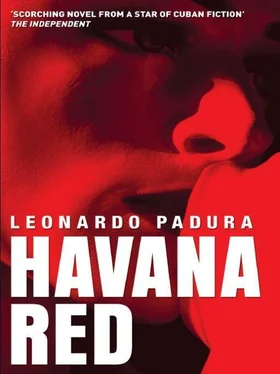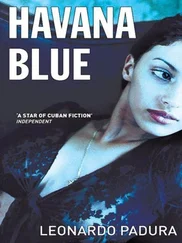Leonardo Padura - Havana Red
Здесь есть возможность читать онлайн «Leonardo Padura - Havana Red» весь текст электронной книги совершенно бесплатно (целиком полную версию без сокращений). В некоторых случаях можно слушать аудио, скачать через торрент в формате fb2 и присутствует краткое содержание. Жанр: Полицейский детектив, на английском языке. Описание произведения, (предисловие) а так же отзывы посетителей доступны на портале библиотеки ЛибКат.
- Название:Havana Red
- Автор:
- Жанр:
- Год:неизвестен
- ISBN:нет данных
- Рейтинг книги:3 / 5. Голосов: 1
-
Избранное:Добавить в избранное
- Отзывы:
-
Ваша оценка:
- 60
- 1
- 2
- 3
- 4
- 5
Havana Red: краткое содержание, описание и аннотация
Предлагаем к чтению аннотацию, описание, краткое содержание или предисловие (зависит от того, что написал сам автор книги «Havana Red»). Если вы не нашли необходимую информацию о книге — напишите в комментариях, мы постараемся отыскать её.
Havana Red — читать онлайн бесплатно полную книгу (весь текст) целиком
Ниже представлен текст книги, разбитый по страницам. Система сохранения места последней прочитанной страницы, позволяет с удобством читать онлайн бесплатно книгу «Havana Red», без необходимости каждый раз заново искать на чём Вы остановились. Поставьте закладку, и сможете в любой момент перейти на страницу, на которой закончили чтение.
Интервал:
Закладка:
“Oh, you’re back already, Mr Police Lieutenant Mario Conde. Tell me right away, because I bet you know who did it. I sometimes see these series where the police get their man straight away, you know? The police are so good at…”
The Count ignored the barbed wit and went into a living room as dark and cool as on the previous day, and sat back in his armchair while Alberto Marques sat in his. He felt they both moved with the premeditation of actors conscious of their movements on stage.
“Would you like a cup of tea? I can give it to you ice cold, ice cubes included…”
“Yes, I think I could do with that,” the Count nodded, and the Marquess disappeared down a corridor at the back of the peculiar stage set arranged in that dark room. Now, as he watched him walk, the policeman noticed that the dramatist had the unlikely springy step of a young lad tiptoeing at an impressive rate, like a rabbit or crane in a hurry. He doesn’t seem that old, thought the Count, but his mind wandered off to the interview awaiting Sergeant Palacios that afternoon. What the hell were they after? A slight but disconcerting feeling of fear lodged in his stomach. Experience screamed at him that an incisive investigation would light on annoying evidence, delicate truths, improbable but definitive clues, and that was why he’d begun to wonder what the hell they were after, while he’d opted to return to the Marquess’s house, driven by a need to find out more: he must log Alexis’s belongings, search for pointers. Meanwhile, Manolo had to carry on research at the Centre for Cultural Heritage on the transvestite and his pathetic friend Salvador K., and look for the Bible the painter had mentioned. But what the hell are they after? he wondered again as the Marquess tiptoed back like a young crane, a cup in each hand. He gave one to the Count and returned to his armchair.
“Should I open the window?”
“If it’s no bother…”
The dramatist put his cup on the floor and opened the window behind him. All the very high windows in the room had grills, and the Count was curious to discover how the rented lovers Miki had mentioned went about taking the house by assault. As the Marquess sat back in his chair, the Count understood how it had all been prepared afresh: the sun, perfectly arranged, only allowed him sight of the man’s silhouette. He was expecting me, he thought.
“Well, don’t prolong the torture… Are you on to something?” And he blinked insistently.
“Very little, in fact… But this case has its curious features. Alexis was strangled but didn’t put up a fight.”
“For God’s sake,” the old dramatist exclaimed softly, touching his neck as if to beat off a strangler’s approaching hands.
“And after he was dead, the assassin stuck two coins up his anus.”
“Ay, ay, ay,” repeated the dramatist, closing his legs as if to avoid possible monetary penetration.
“Have you ever heard of anything like it?”
“No, never… It’s like something out of a mafia film.”
“Yes, you could say that… The other thing I did was to read a bit of the book you lent me and I learned several things about transvestites.”
“Of interest, I hope?”
“Yes, but a touch too conceptual. Is it really true transvestites go in for all this philosophy of mimetics and erasure?”
In spite of the intense background glare, the Count thought he saw the Marquess smile.
No other city in the world – not even Havana – can offer the miraculous harmonies of Paris. In Paris evening and night fuse in a tentative symphony, dawn seems a necessary consequence, shy yet inevitable, and if the spirit of man can penetrate by osmosis the sensibility in the breeze, stones, smells and colours of Paris, life in the city can be a gift from the gods: and that’s how I felt, that spring.
Washed and perfumed, we got into the taxi and my hands sweated profusely on the drive, as my eyes twice saw the illuminated shape of the Eiffel Tower, the edifice of the Opera, the cheerfully lit Cafe de la Paix, until we turned down narrow, cobble-stoned side streets – cobbles that had become famous the previous year, when love, intelligence and ideology spawned revolutionary copulations behind barricades made from the very same cobbles – the sinuous streets of the Quartier Latin, and we stopped in front of a neon-lit joint advertising LES FEMMES, a gateway to a dive we anxiously desired. Muscles paid and said something to the taxi-driver – a Moroccan, who handed him a small envelope – while the Other Boy and I contemplated the shabbiness of the place; then the padded door creaked noisily open to give us our first vision of the cabaret: a blue glow.
Muscles came over to us and for the first time that spring on my last visit to Paris I saw his round peasant face, still slightly uncouth, beam with happiness. A few days earlier, when I’d arrived in Paris, he’d told me about the end of his relationship with Julien, the young anthropologist he’d lived with over the last two years on a permanent honeymoon – as Muscles reported it, a man at other times so exquisite in his poetic images – and who’d humiliated him by leaving him for a woman: no more, no less than a Russian dancer – and corps de ballet, not even a soloist – who’d defected from the Bolshoi. As ideology had interfered in matters of love, I commented and queried: “Did the dancer carry the plague in her armpits and have a shotputter’s face like most of our Soviet sisters?” Women, what filth, we chorused, and Muscles could only laugh… But now, near that blue, yellow-lettered cabaret, Muscles seemed to rediscover his desire to live.
“Come on,” he said, and took us by the arm (my left, the Other Boy’s right), and dragged us into the blue glow… Light shone from the floor and drew volutes of smoke, over-sweet even for Virginian cigarettes, which mixed its hypnotic emanations with the waft of acrid sweat and the heavy perfume of Arab essences that are sold wholesale in Paris’s apocryphal Persian markets. Their ears, in the meantime, were hit by the wild rhythms unleashed by the voice of Miriam Makeba (a Third World invasion), projected from a cubbyhole built in the wall. I felt strangely afraid to find myself at the vortex of that attack on all the senses, but Muscles and the Other seemed to have entered familiar territory where they moved completely naturally. Then I started to see fake Valkyries performing their ancient function as pourers of beer. They seemed to float on the blue, like phosphorescent, newly hatched chrysalises, parading the starched organdy and anorexic pleated skirts they modelled as the last word in retro chic. Each Valkyrie carried a tray of glasses in one hand and yellow (yellow?) flowers in the other. I was looking at those hands, too large even for a Valkyrie, even for such a genuinely Scandinavian item, when one exemplar brushed her tunic’s abrasive edge against me and I felt I’d been touched by a prehistoric insect.
I was bewildered and grateful that Muscles pushed me towards a table, where the Other Boy was already seated, drinking an amber liquid I soon discovered wasn’t beer. How did he manage it, that innate ability of his always to get there first? Then the disc jockey switched from Makeba to Doris Day and I discovered that, like any good cabaret, Les Femmes had a stage where seven perfect – if not more than perfect – versions of Doris Day had settled – they must have settled – singing along to the recording to the delight of an enraptured audience, where I began to see men and women whose affiliations I doubted: too many opulent, peroxide blondes in best Marilyn Monroe style, dark-skinned beauties from post-war Italian cinema, black women with large, acromegalic hands and metallic robo-comic lips which regaled their colleagues around the table with kisses as intense and syncopated as Doris Day’s ballad.
Читать дальшеИнтервал:
Закладка:
Похожие книги на «Havana Red»
Представляем Вашему вниманию похожие книги на «Havana Red» списком для выбора. Мы отобрали схожую по названию и смыслу литературу в надежде предоставить читателям больше вариантов отыскать новые, интересные, ещё непрочитанные произведения.
Обсуждение, отзывы о книге «Havana Red» и просто собственные мнения читателей. Оставьте ваши комментарии, напишите, что Вы думаете о произведении, его смысле или главных героях. Укажите что конкретно понравилось, а что нет, и почему Вы так считаете.











